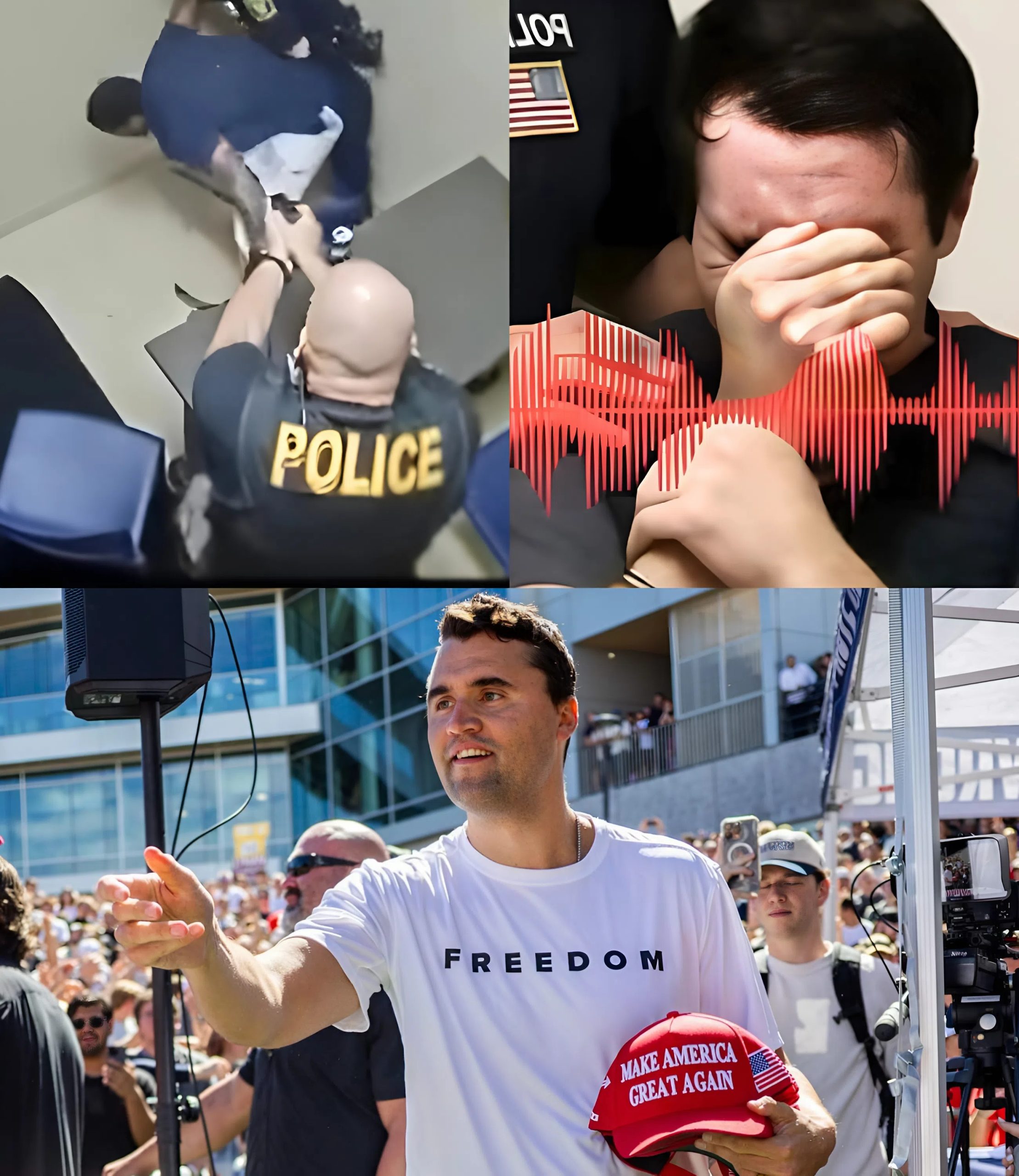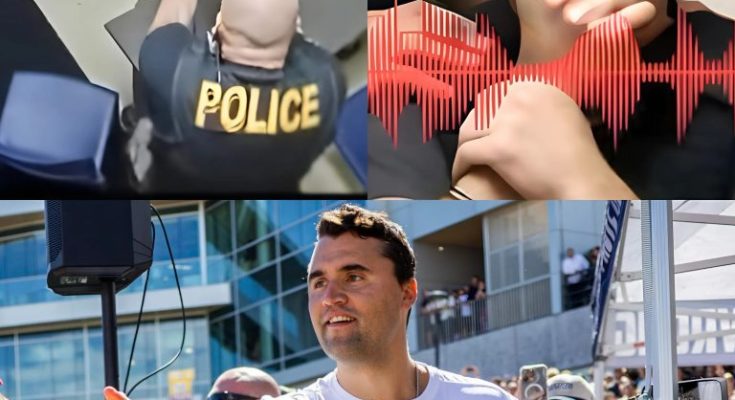A tragedy of shocking immediacy has gripped the nation in the past days, and with each passing hour, the contours of the event grow more chilling. The recent leak of Charlie Kirk’s final 911 call has brought the private horror of his last moments into public view, revealing a story that is both intimate and terrifying. For those who have followed Kirk’s career, the recording offers a stark, almost unbearable contrast to the public figure: a man stripped bare of influence, title, and persona, facing the raw inevitability of mortality.
The Anatomy of the Last 72 Seconds
The recording itself, running under two minutes, is a masterclass in human vulnerability under duress. Kirk’s voice, tense and disjointed, communicates fear in its purest form. Listeners have noted the sharp escalation of panic in real time, his words fractured, sentences abandoned mid-thought, breaths jagged and urgent. But the most haunting element lies not only in his own voice, but in the second, unidentified voice that punctuates the call — calm, almost methodical, delivering a line that chills the spine: “They won’t make it in time.”

This phrase, repeated and emphasized in the recording, resonates far beyond its literal meaning. Psychologists suggest that in moments of acute danger, a person’s awareness of time compresses, creating a heightened perception of imminent threat. Kirk’s panic, contrasted with the measured tone of the secondary voice, underscores the tragedy of helplessness — that terrifying intersection where action and inaction collide, and survival feels both necessary and impossible.
Experts in trauma response have analyzed such calls extensively, noting that final words often reveal a raw, unfiltered emotional state. In Kirk’s case, the combination of panic, disorientation, and fragmented speech patterns provides a window into the physiology of fear: the rapid heartbeat reflected in vocal tremors, shallow breaths signaling adrenaline surges, and the near-incoherent language of someone confronting imminent death. Yet it is the interplay between his fear and the calm warnings from the background voice that elevates the recording from merely tragic to profoundly disturbing.
Humanity Behind the Public Persona
Charlie Kirk, known widely for his political activism and outspoken public life, is presented in this recording in a manner starkly different from his public persona. Social media often freezes figures into symbols — confident, articulate, and untouchable. Yet here, Kirk’s voice reveals vulnerability, mortality, and the stark reality that no amount of public influence can shield one from life’s cruelest moments.
It is a sobering reminder that behind every high-profile persona exists a human being subject to the same fragility and fear as anyone else. His final words, laden with desperation, reflect a universal human experience: confronting the unknown with nothing but one’s own voice as a lifeline. For listeners, this revelation is almost unbearable, an intimate look at mortality transmitted across the ether, leaving a lingering sense of grief and helplessness.

The Ethics of a Leak
The dissemination of the 911 recording has ignited not only public shock but also moral debate. Emergency calls are legally and ethically protected to preserve the privacy of victims and their families. The leak of Kirk’s call raises serious questions about the boundaries of media, public curiosity, and the ethics of sharing trauma. Critics argue that circulating such private moments risks transforming grief into spectacle, while others contend that the recording provides valuable insight into human behavior under extreme stress, as well as the social and psychological implications of trauma in public figures.
On social media, reactions have been polarized. Some mourners and analysts express gratitude for the transparency, claiming it humanizes Kirk in ways no public speech ever could. Others have condemned the leak as exploitative, highlighting a troubling trend in modern media where tragedy is often repackaged for virality. The debate touches on a fundamental societal tension: the desire for immediacy and raw truth versus the obligation to maintain dignity, even in death.
The Power of Sound and Silence
Perhaps the most haunting aspect of the recording lies not in the words themselves, but in the spaces between them — the silence, punctuated by breaths, pauses, and the faint background noise. These moments of stillness are where the human mind projects its deepest fears. The voice of the unidentified speaker, calm and foreboding, becomes almost a character in itself, a chilling counterpoint to Kirk’s escalating panic.
In these seconds, listeners are forced to confront a visceral truth: the human experience of crisis is not just visual or narrative, but profoundly auditory. Sound carries emotion, urgency, and terror in a way that images cannot. The interplay of sound and silence within Kirk’s call creates a sense of immediacy that is impossible to ignore, leaving a haunting imprint on all who hear it.
Psychological Reflections
Trauma specialists emphasize that witnessing, even indirectly, someone else’s acute fear can trigger empathetic stress responses. Public exposure to Kirk’s final moments may evoke collective anxiety, grief, and a heightened awareness of mortality. In the context of this leaked call, listeners may find themselves grappling with existential questions: How would I respond in such a moment? Could anyone really “make it in time”?
Moreover, the recording raises broader questions about the human response to impending tragedy. The secondary voice, calm yet ominous, suggests a resigned acknowledgment of events beyond control. This tension — between panic and composure, action and inevitability — is a reflection of human psychology under pressure, offering insights into both individual resilience and collective helplessness.

A Nation Reacts
The public response to the leak has been intense. Vigils and online memorials have multiplied, illustrating a societal need to process tragedy communally. Supporters and critics alike have grappled with the stark humanity revealed in the recording. The leak has forced a confrontation with uncomfortable truths: that even the most visible and influential among us are not immune to fear, that life can change in an instant, and that sometimes, help truly does arrive too late.
Journalists, social commentators, and psychologists have weighed in, exploring themes ranging from public scrutiny and privacy to the physiological and emotional aspects of crisis. The discussion has illuminated not just Kirk’s last moments, but our collective fascination — and discomfort — with witnessing finality in real time.
The 72 Seconds That Redefine Time
Those final 72 seconds, immortalized in the leaked recording, are more than a chronological measure; they are a lens into human vulnerability. Every breath, pause, and uttered word captures the interplay of hope, fear, and the stark confrontation with mortality. These seconds encapsulate what trauma researchers call the “perception of compressed time,” where moments stretch and condense in ways that defy conventional experience. For Kirk, those seconds were a lifetime compressed, a private battle made painfully public.
Looking Forward: Lessons and Reflections
While authorities continue to investigate the circumstances surrounding Kirk’s death, the recording itself serves as a lasting document of both human fragility and societal fascination with finality. It challenges us to reconsider our relationship with privacy, media, and empathy. In exposing the intimate horror of one individual’s last moments, it reminds us of the universal vulnerability inherent in the human condition.
Most of all, the leaked call is a reminder that life is unpredictable, fleeting, and, at times, tragically uncontrollable. In the echo of the final words and the haunting calm of the secondary voice, the public is left with a sobering truth: sometimes, no matter how fast, how prepared, or how desperate the effort, they won’t make it in time.



